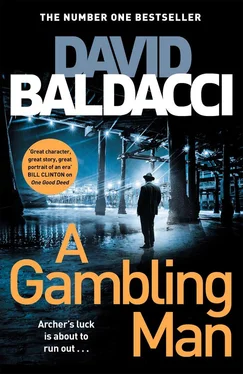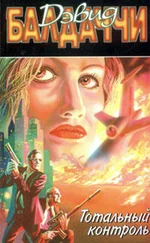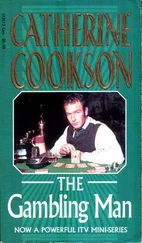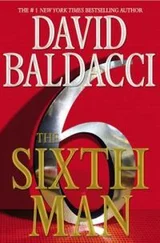Archer had flown on the military version of the DC-4 during the war. That brought back memories of a harrowing flight in dense fog that resulted in a crash landing in which not everyone had survived. But since it was World War II, the grunts who did survive got off and took up the fight once more as though nothing remotely unnerving had happened. He had never really cared for riding in planes after that.
He crossed Sawyer Avenue going toward the ocean, and he could see what the soda jerk girl had meant. Even the dogs looked healthier over here, as did the flowers, trees, and bushes. And the sidewalks held not a scrap of paper or other trash. People were clothed in nicer duds. The price tags of the cars cruising along became elevated, pickup trucks and old, dented Fords were replaced with Coupe de Villes, Eldorados, and chromed Buick Roadmasters that looked big enough to live in. The shop fronts were classier and catered to a clientele that obviously had money. Archer had passed one beauty parlor on the other side of Sawyer. It was dingy with two cracked vinyl chairs, a dirty window, and two old women in their housecoats getting their hair dyed a color he didn’t recognize offhand. He had already passed four beauty parlors on the ritzier side of Sawyer, and each one was nicer than the one before, where each well-heeled patron was greeted at the door with a smile, a handshake, and a symbolic kiss on the behind.
Archer slowed down for traffic and then stopped in front of a shop selling furs. He peered through the front glass and saw a hostess in a long pale green gown and silver shoes catering to an old woman and what looked to be her twenty-something granddaughter, while a tall young woman modeled an ankle-length mink coat. Both granny and granddaughter looked enthralled at the prospect of draping the remnants of dead things over themselves.
He next passed the Mayport Hotel, which Kemper owned. It was six stories high and had twin columns out front, along with a top-hatted doorman in full faux military regalia. A long, pristine burgundy awning was stenciled with the hotel’s name in fancy swirls and loops of calligraphy. A cabstand out front was doing a brisk business. Tall windows were on the street side, and an oak revolving door near the end of the left side of the hotel invited folks into the Mayport Bar and Lounge for libations, live music, and good times, or so the sign said. Through one window Archer could see women in stylish hats and dress gloves having what looked to be a refined tea in the main dining area.
He kept driving and turned left and then right before reaching Idaho Avenue. It was a trim street, shadowed and cooled by a canopy of overhanging trees. The road here transformed from asphalt to cobblestones, and the Delahaye bumped uncomfortably over them. A policeman was on the corner telling traffic where and when to go, and Archer waited his turn until the uniformed gent sent him on his way with a sharp wave of a white-gloved hand.
He’d seen six prowl cars on the other side of Sawyer Avenue and not one on this side. As though the rich didn’t commit crimes, thought Archer. Yet, he also knew that those with lots of money didn’t do it in the open with a gun or knife or a fist like a workingman might employ. They did it in the shadows four layers removed from the actual dirty deed, and nobody came after them because they could afford the best lawyers, knew all the judges, gave to charity, and had good teeth.
He parked in front of a ten-story limestone building that was as neat and refined as the street.
THE KEMPER BUILDING, the gold wall plaque outside read. Archer thought Kemper might operate all his myriad businesses out of this place and then he probably rented the rest of it to other tenants. The receptionist took his name and request and got on her sleek telephone switchboard to call up to Douglas Kemper’s office. With that done, she sent him on his way with the suite number on the very top floor.
He eyed the marquee in the lobby, and it showed that the place was fully leased, to businesses with impressive-sounding names. Overcoming his fear of enclosed spaces, Archer rode an automatic elevator car up to the top floor. It had been a bit easier to beat his phobia this time, because the elevator was mostly all glass wrapped in chrome. He thought Earl from Dash’s building might go crazy riding up and down all day in the thing. And he assumed at night that one might get some unsettling reflections. He, for one, didn’t want delusions occurring at a hundred feet in the air.
But then again, they probably exist at street level, too.
A pair of reflective glass doors with platinum wrappers greeted Archer at the entrance to Kemper Enterprises. Two large rubber plants in thousand-pound cast stone pots with lions in raised relief on their sides guarded this portal. Since there was no sunlight in the hall Archer wondered how these beauties could manage, but when he touched them and then smelled them, he realized they were fake.
He opened one of the doors and stepped through. It was then that he realized the revealed anteroom was just a tease. There was no one and nothing here. Just four walls painted black and a hat and coat rack, stuck in one corner, that was bereft of both hats and coats.
The door set directly across from him was thick oak and he found out it was locked. He saw the buzzer and the voice box, so he buzzed and prepared to use his voice.
A woman answered, “Yes?”
“Aloysius Archer here to see either Mr. Kemper or Mr. Wilson Sheen.”
“Do you have an appointment?”
“No, but they should be expecting me. We met this morning at Willie Dash’s office.”
“Oh,” said the voice, and Archer heard what he expected to hear — the door being buzzed open.
He gripped the knob, pulled, and stepped into la-la land, at least at first blush. His opinion didn’t change much on the second blush.
The room was cavernous, awash in light, indeed so much light that stepping from a dark hall into a darker anteroom and then into this burst of illumination made Archer’s eyes squint, his pupils contract, and his head momentarily pound. The windows were floor-to-ceilings and let in as much of the descending California sun as was humanly possible. There was not a drape to be had in the whole space, apparently.
There were six uniform desks, each lined up with the other. And on a raised dais behind them was one desk, twice as large as the others. Six women sat in the lower section. They all looked to be in their twenties, well scrubbed, professionally dressed, efficient, earnest, smart, ambitious, and platinum blonde right down to the part in the middle of the scalp. They could be sextuplets, down to their bone marrow. Carriage typewriters clicked and clacked, phones rang, and a stock market tape rattled along on one walnut-carved credenza spelling doom or fortune, depending on one’s Wall Street position. There was a frenetic energy here that was hard for Archer to wrap his head around. These ladies seemed to be living life at a different speed from the rest of humanity.
Since the hat rack outside was empty, he figured they must keep theirs in their desk drawers.
The walls were upholstered in what looked to be brown leather two-by-two tiles. On these walls hung paintings of seascapes and landscapes and mountainscapes, as well as other scapes Archer had never contemplated before. A marble statue of a naked woman and baby stood in one corner. Real plants whiled away their time in cast stone pots that dwarfed the ones in the hall. The overhead light fixtures were grand chandeliers with about a thousand pieces of cut crystal each, and they looked like a bitch to clean and even more of a bitch to raise to the ceiling. And that ceiling. It was flat metal copper plates acid-washed with blue, black, brown, and teal slashes. It looked like something you’d see in Europe before the war took its pound of flesh and everything else.
Читать дальше








![Дэвид Балдаччи - A Gambling Man [calibre]](/books/384314/devid-baldachchi-a-gambling-man-calibre-thumb.webp)



